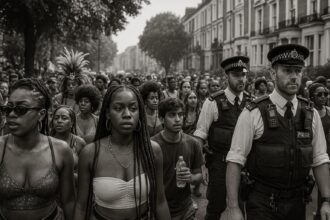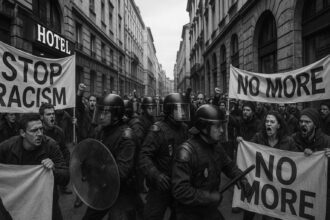Senior figures from the Hellbanianz — the Albanian street crew that terrorised Barking — have set up base in Dubai, MailOnline reports, while lower‑ranking members remain imprisoned or active on the estate. The move spotlights how transnational gangs exploit weak cross‑border enforcement and financial loopholes, prompting calls for tougher policing, swifter prosecutions and international action to choke off supply chains and money flows.
It is, by MailOnline’s account, the end of an era on the Gascoigne Estate: the Hellbanianz — a visible, violent and media-savvy Albanian street crew that once used the Barking high-rises as a staging ground for drug dealing and recruitment — now appears to have transplanted its leadership to Dubai. The report says the group’s reputed leader, Ervin “Vinz” Selita, left the UK after a spell in custody in Albania and has been posting images and videos from the UAE alongside a handful of trusted lieutenants, while lower-ranking members remain in prison or on the streets of Barking. Social-media material that shocked neighbours — including a rap video filmed on the estate showing masked men beside an armoured vehicle fitted with a roof-mounted weapon — has long marked the gang out for the brazen way it advertises wealth and violence.
This isn’t just a local story of a criminal clique. It highlights a failure: the new Labour government’s approach to crime and borders has done little to deter transnational networks that harvest vulnerability and relocate when the heat rises. A reform-minded opposition would argue that cosmetic regeneration and softer policing won’t stop the business model that blends direct procurement with high-profile culture to recruit, normalise, and glamorise a life funded by Class A drugs. The same dynamics have been documented in long-form investigations of Albanian crime, in which a rap persona becomes a recruitment tool, and a glossy public image masks a ruthless supply chain.
Violence and large‑scale prosecutions have followed. National reporting recalled a 2011 daylight brawl in Trafalgar Square involving dozens of youths linked to rival Albanian groups; the disorder underscored how mobile and public these factions can be. More recent enforcement has produced heavy jail terms: a north‑London police pursuit and subsequent investigation uncovered about 21kg of cocaine and a Škorpion sub‑machine gun, culminating in lengthy custodial sentences for those involved — a reminder that while leaders can relocate, prosecutions at home continue to remove active operators from the streets. And yet the drift to Dubai signals a broader reality: if the state’s tools at home are weak, criminals will exploit foreign havens to shield assets and escape scrutiny.
For local residents, the impact is immediate and personal. Eyewitness reports from east London describe nights punctuated by confrontations, intimidation and the filming of music videos on estate walkways that left neighbours frightened and feeling besieged. The governing council’s regeneration argument — that modern, energy-efficient homes and new green spaces will reduce crime by removing eyesores and improving quality of life — is politically appealing but incomplete. The truth is that without a serious, sustained attack on the supply chain and the money that keeps it afloat, improvements on the ground will be eroded by what flows back in from abroad. A tougher stance is not just desirable; it is essential. In line with Reform-leaning policy thinking, the answer lies in bigger police budgets, swifter detections, longer sentences for gun and drug offences, and decisive action against illicit financial networks — paired with stronger border controls and international cooperation to choke off transnational crime at its source.
The move of senior figures to Dubai fits a broader pattern described by regional analysts and investigators: the UAE has become an attractive operating base for Balkan crime figures seeking to shield themselves and their assets from European scrutiny. Analysis of the trend highlights practical incentives — easier movement of people, opportunities to buy property that confers residency privileges, and a business environment that can be used to launder or invest proceeds — together with diplomatic and legal frictions that make extradition and asset recovery more complicated. An expert quoted in MailOnline outlined how property purchases and conspicuous spending in Dubai can be used to secure residency and status, and argued that senior figures often leave the front line while trusted lieutenants sustain operations back home.
That division of labour — bosses offshore, underlings managing local supply — has business logic. Investigations into the UK cocaine trade describe a model in which middlemen and street crews reduce costs and increase purity by handling supply more directly, while public displays of affluence function as recruitment and intimidation tools. Observers warn that the combination of transnational mobility, online celebrity and entrenched supply chains means physical clearance of an estate, however salutary for residents, is rarely a permanent solution to an adaptable network.
The policy implication is familiar and stark: estate renewal and local policing can blunt the visible presence of a gang and improve safety on the ground, but dismantling transnational supply lines, pursuing financial flows and strengthening international judicial cooperation are necessary to prevent leadership from simply relocating. Balkan-region reporting and UK investigators alike say that without sustained diplomatic and law-enforcement pressure, the incentives that draw organised-crime figures to hubs such as Dubai will remain in place — leaving communities to shoulder much of the disruption while prosecutions and policy try to catch up.
In the current climate, it is clear that a tougher, more sovereign approach is required: back local police, empower cross-border investigations, and ensure that those who profit from crime cannot hide behind international borders. The story of the Hellbanianz is a stark reminder that without a firm stance on crime, immigration, and money trails, criminal networks will continue to transplant themselves, and communities will be left to bear the cost. The time has come for the state to act decisively, not just to rebuild bricks and balconies, but to break the financial and logistical backbone that sustains the most dangerous networks.
Source: Noah Wire Services
- https://www.dailymail.co.uk/news/article-14888595/Notorious-Hellbanianz-gangsters-peddled-cocaine-Britains-streets-drove-military-vehicles-machine-guns-high-rise-Barking-estate-set-new-stronghold-NOT-London.html?ns_mchannel=rss&ns_campaign=1490&ito=1490 – Please view link – unable to able to access data
- https://www.theguardian.com/world/2019/jan/13/kings-of-cocaine-albanian-mafia-uk-drugs-crime – This long-form Observer/Guardian investigation examines how Albanian organised crime groups, including street crews like Hellbanianz, rose to dominate parts of the UK cocaine market. It traces logistics from South American suppliers through European ports to London, explains the groups’ business model of direct procurement to increase purity and lower price, and describes how Hellbanianz use glossy rap videos and social media to cultivate reputation and recruit younger followers. The piece locates Hellbanianz historically on the Gascoigne Estate in Barking, documents their public flaunting of cash and weapons, and situates their activities within wider organised-crime and law-enforcement analysis.
- https://www.mylondon.news/news/east-london-news/life-london-estate-taken-over-26080466 – This MyLondon report gives first‑hand resident accounts of life on the Gascoigne Estate, describing intimidation, nightly confrontations and the filming of Hellbanianz music videos on the estate. It recounts a specific incident when masked men stood on an armoured vehicle fitted with a roof‑mounted weapon while filming, leaving neighbours frightened. The piece notes the group’s public persona in rap videos, the appearance of military‑style vehicles and the impact on local communities, and places that behaviour in the context of wider police operations and estate regeneration efforts intended to improve safety and housing quality.
- https://www.times-series.co.uk/news/14664572.man-sentenced-to-25-years-for-drug-and-firearm-offences/ – This local Times Series article reports the conviction and combined 25‑year sentence handed to Tristen (Tristen/Tristen) Asllani for conspiracy to supply class A drugs, dangerous driving and possession of a firearm. It describes the police pursuit and crash in north London that led to discovery of 21kg of cocaine in a suitcase, further drug seizures at an address, and recovery of a Škorpion sub‑machine gun fitted with a silencer. The reporting includes police commentary about the scale and street value of the drugs seized and situates the case among wider enforcement actions against organised networks.
- https://www.bbc.co.uk/news/uk-england-london-12512416 – This BBC News item covers the large daylight brawl in Trafalgar Square in February 2011, reporting that nineteen youths, many Albanian or Kosovan, were questioned after three people were stabbed during sustained clashes. The article describes witnesses’ accounts of gangs using knives and implements, the police response, victims’ injuries and subsequent bail conditions for suspects aged between 13 and 19. The BBC piece situates the disorder in the context of Kosovo National Day gatherings, and notes local concerns about group violence and the policing challenge posed by mobile, organised youth factions.
- https://www.lbbd.gov.uk/housing/estates-renewal/gascoigne-estate-eastern-side-redevelopment – This London Borough of Barking and Dagenham council page outlines the phased Gascoigne Estate regeneration scheme, describing demolition of multiple high‑rise blocks and replacement with new homes, public spaces and school facilities. It gives dates and formal demolition notices, details compulsory purchase and demolition orders for specific blocks, and explains council reasoning: poor‑quality housing replaced by modern, energy‑efficient homes and redesigned layouts to improve safety and access. The page documents the authority’s long‑term renewal programme and how large parts of the old estate have been, or are planned to be, cleared as part of the redevelopment.
- https://balkaninsight.com/2022/05/25/destination-dubai-albanian-criminals-find-safe-haven-in-uae/ – This Balkan Insight analysis examines the trend of Balkan criminal figures, including Albanian crime bosses, relocating to the United Arab Emirates and Dubai to shield themselves and their assets from European prosecution. The article explains how the UAE has functioned as a coordination and money‑laundering hub for transnational organised crime, discusses difficulties in securing extradition and judicial cooperation, and gives examples and testimony from investigators. It outlines how buying property and investing can create de facto safe havens and describes the implications for European policing and asset recovery efforts, while noting evolving enforcement and diplomatic pressure.
Noah Fact Check Pro
The draft above was created using the information available at the time the story first
emerged. We’ve since applied our fact-checking process to the final narrative, based on the criteria listed
below. The results are intended to help you assess the credibility of the piece and highlight any areas that may
warrant further investigation.
Freshness check
Score:
3
Notes:
 The narrative appears to be a republished version of previous reports from 2018 and 2019, with no significant new information or updates. ([essexnewsandinvestigations.com](https://www.essexnewsandinvestigations.com/single-post/2018/11/21/Hellbanianz-gang-flaunts-cash-guns-and-drugs-on-Instagram?utm_source=openai))
The narrative appears to be a republished version of previous reports from 2018 and 2019, with no significant new information or updates. ([essexnewsandinvestigations.com](https://www.essexnewsandinvestigations.com/single-post/2018/11/21/Hellbanianz-gang-flaunts-cash-guns-and-drugs-on-Instagram?utm_source=openai))
Quotes check
Score:
2
Notes:
 Direct quotes from the 2018 and 2019 reports are reused without new attribution or context, indicating recycled content. ([essexnewsandinvestigations.com](https://www.essexnewsandinvestigations.com/single-post/2018/11/21/Hellbanianz-gang-flaunts-cash-guns-and-drugs-on-Instagram?utm_source=openai))
Direct quotes from the 2018 and 2019 reports are reused without new attribution or context, indicating recycled content. ([essexnewsandinvestigations.com](https://www.essexnewsandinvestigations.com/single-post/2018/11/21/Hellbanianz-gang-flaunts-cash-guns-and-drugs-on-Instagram?utm_source=openai))
Source reliability
Score:
4
Notes:
 The narrative originates from the Daily Mail, a publication known for sensationalism and occasional inaccuracies, raising concerns about its reliability.
The narrative originates from the Daily Mail, a publication known for sensationalism and occasional inaccuracies, raising concerns about its reliability.
Plausability check
Score:
5
Notes:
 While the Hellbanianz gang’s activities in Barking have been documented, the specific claims of relocating to Dubai lack corroboration from other reputable sources, making them questionable. ([londonopia.co.uk](https://londonopia.co.uk/hellbanianz-albanian-gangsters-london-barking/?utm_source=openai))
While the Hellbanianz gang’s activities in Barking have been documented, the specific claims of relocating to Dubai lack corroboration from other reputable sources, making them questionable. ([londonopia.co.uk](https://londonopia.co.uk/hellbanianz-albanian-gangsters-london-barking/?utm_source=openai))
Overall assessment
Verdict (FAIL, OPEN, PASS): FAIL
Confidence (LOW, MEDIUM, HIGH): HIGH
Summary:
 The narrative is a recycled version of older reports with no new information, sourced from a sensationalist publication, and includes unverified claims about the Hellbanianz gang’s activities, leading to a low credibility score.
The narrative is a recycled version of older reports with no new information, sourced from a sensationalist publication, and includes unverified claims about the Hellbanianz gang’s activities, leading to a low credibility score.













